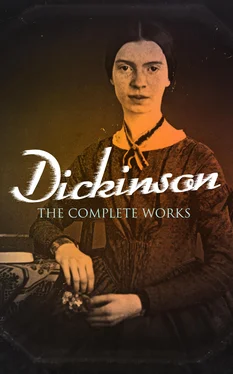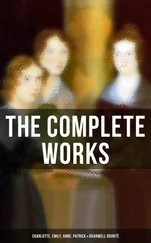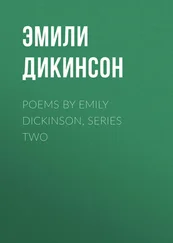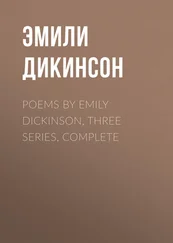Table of Contents
Lay this laurel on the one
Too intrinsic for renown.
Laurel! veil your deathless tree, —
Him you chasten, that is he!
Table of Contents Table of Contents Poems: First Series Poems: Second Series Poems: Third Series The Single Hound The Life and Letters of Emily Dickinson
It's all I have to bring to-day,
This, and my heart beside,
This, and my heart, and all the fields,
And all the meadows wide.
Be sure you count, should I forget, —
Some one the sum could tell, —
This, and my heart, and all the bees
Which in the clover dwell.
PREFACE.
BOOK I. LIFE
I. Real Riches
II. Superiority to Fate
III. Hope
IV. Forbidden Fruit (1)
V. Forbidden Fruit (2)
VI. A Word
VII. "To venerate the simple days"
VIII. Life's Trades
IX. "Drowning is not so pitiful"
X. "How still the bells in steeples stand"
XI. "If the foolish call them 'flowers'"
XII. A Syllable
XIII. Parting
XIV. Aspiration
XV. The Inevitable
XVI. A Book
XVII. "Who has not found the heaven below"
XVIII. A Portrait
XIX. I had a Guinea Golden
XX. Saturday Afternoon
XXI. "Few get enough, enough is one"
XXII. "Upon the gallows hung a wretch"
XXIII. The Lost Thought
XXIV. Reticence
XXV. With Flowers
XXVI. "The farthest thunder that I heard"
XXVII. "On the bleakness of my lot"
XXVIII. Contrast
XXIX. Friends
XXX. Fire
XXXI. A Man
XXXII. Ventures
XXXIII. Griefs
XXXIV. "I have a king who does not speak"
XXXV. Disenchantment
XXXVI. Lost Faith
XXXVII. Lost Joy
XXXVIII. "I worked for chaff, and earning wheat"
XXXIX. "Life, and Death, and Giants"
XL. Alpine Glow
XLI. Remembrance
XLII. "To hang our head ostensibly"
XLIII. The Brain
XLIV. "The bone that has no marrow"
XLV. The Past
XLVI. "To help our bleaker parts"
XLVII. "What soft, cherubic creatures"
XLVIII. Desire
XLIX. Philosophy
L. Power
LI. "A modest lot, a fame petite"
LII "Is bliss, then, such abyss "
LII. Experience
LIV. Thanksgiving Day
LV. Childish Griefs
BOOK II. LOVE
I. Consecration
II. Love's Humility
III. Love
IV. Satisfied
V. With a Flower
VI. Song
VII. Loyalty
VIII. "To lose thee, sweeter than to gain"
IX. "Poor little heart I"
X. Forgotten
XI. "I 've got an arrow here"
XII. The Master
XIII. "Heart, we will forget him!"
XIV. "Father, I bring thee not myself"
XV. "We outgrow love, like other things"
XVI. "Not with a club the heart is broken"
XVII. Who?
XVIII. "He touched me, so I live to know"
XIX. Dreams
XX. Numen Lumen
XXI. Longing
XXII. Wedded
BOOK III. NATURE
I. Nature's Changes
II. The Tulip
III. "A light exists in spring"
IV. The Waking Year
V. To March
VI. March
VII. Dawn
VIII. "A murmur in the trees to note"
IX. "Morning is the place for dew"
X. "To my quick ears the leaves conferred"
XI. A Rose
XII. "High from the earth I heard a bird"
XIII. Cobwebs
XIV. A Well
XV. "To make a prairie it takes a clover"
XVI. The Wind
XVII. "A dew sufficed itself"
XVIII. The Woodpecker
XIX. A Snake
XX. "Could I but ride indefinite"
XXI. The Moon
XXII. The Bat
XXIII. The Balloon
XXIV. Evening
XXV. Cocoon
XXVI. Sunset
XXVII. Aurora
XXVIII. The Coming of Night
XXIX. Aftermath
BOOK IV. TIME AND ETERNITY
I. "This world is not conclusion"
II. "We learn in the retreating"
III. "They say that 'time assuages'"
IV. "We cover thee, sweet face"
V. Ending
VI. "The stimulus, beyond the grave"
VII. "Given in marriage unto thee"
VIII. "That such have died enables us"
IX. "They won't frown always, some sweet day"
X. Immortality
XI. " The distance that the dead have gone"
XII. "How dare the robins sing"
XIII. Deat
XIV. Unwarned
XV. "Each that we lose takes part of us"
XVI. "Not any higher stands the grave"
XVII. Asleep
XVIII. The Spirit
XIX. The Monument
XX. "Bless God, he went as soldiers"
XXI. "Immortal is an ample word"
XXII. "Where every bird is bold to go"
XXIII. "The grave my little cottage is"
XXIV. "This was in the white of the year"
XXV. "Sweet hours have perished here"
XXVI. "Me! Come! My dazzled face"
XXVII. Invisible
XXVIII. "I wish I knew that woman's name"
XXIX. Trying to Forget
XXX. "I felt a funeral in my brain"
XXXI. "I meant to find her when I came"
XXXII. Waiting
XXXIII. "A sickness of this world it most occasions"
XXXIV. "Superfluous were the sun"
XXXV. "So proud she was to die"
XXXVI. Farewell
XXXVII. "The dying need but little, dear"
XXXVIII. Dead
XXXIX. "The soul should always stand ajar"
XL. "Three weeks passed since I had seen her"
XLI. "I breathed enough to learn the trick"
XLII. "I wonder if the sepulchre"
XLIII. Joy in Death
XLIV. "If I may have it when it's dead"
XLV. "Before the ice is in the poo's"
XLVI. Dying
XLVII. "Adrift! A little boat adrift!"
XLVIII. "There's been a death in the opposite house"
XLIX. "We never know we go, when we are going"
L. The Soul's Storm
LI. "Water is taught by thirst"
LII. Thirst
LIII. "A clock stopped not the mantel's"
LIV. Charlotte Bronte's Grave
LV. "A toad can die of light!"
LVI. "Far from love the Heavenly Father"
LVII. Sleeping
LVIII. Retrospect
LIX. Eternity
Table of Contents
The intellectual activity of Emily Dickinson was so great that a large and characteristic choice is still possible among her literary material, and this third volume of her verses is put forth in response to the repeated wish of the admirers of her peculiar genius. Much of Emily Dickinson's prose was rhythmic, —even rhymed, though frequently not set apart in lines.
Also many verses, written as such, were sent to friends in letters; these were published in 1894, in the volumes of her Letters . It has not been necessary, however, to include them in this Series, and all have been omitted, except three or four exceptionally strong ones, as "A Book," and "With Flowers."
There is internal evidence that many of the poems were simply spontaneous flashes of insight, apparently unrelated to outward circumstance. Others, however, had an obvious personal origin; for example, the verses "I had a Guinea golden," which seem to have been sent to some friend travelling in Europe, as a dainty reminder of letter-writing delinquencies. The surroundings in which any of Emily Dickinson's verses are known to have been written usually serve to explain them clearly; but in general the present volume is full of thoughts needing no interpretation to those who apprehend this scintillating spirit.
M. L. T.
AMHERST, October , 1896.
Table of Contents
Table of Contents
'T is little I could care for pearls
Who own the ample sea;
Or brooches, when the Emperor
With rubies pelteth me;
Or gold, who am the Prince of Mines;
Or diamonds, when I see
A diadem to fit a dome
Continual crowning me.
Читать дальше












